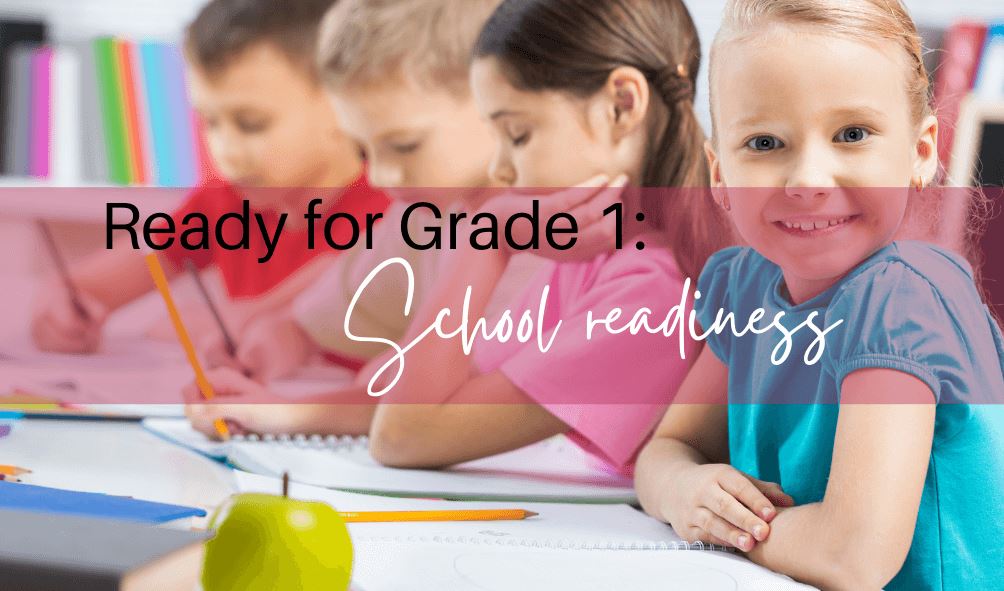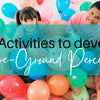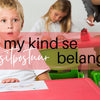School Readiness: How can I support my child on this important journey?

What is School Readiness?
School readiness is a systematic process that goes hand in hand with childhood development. Once children are ready for school, they should be able to cope with formal education requirements. On entering Grade One, children are expected to have reached certain developmental milestones and have the basic skills necessary for formal education. All children go through these developmental milestones at different stages, and some may need extra help mastering specific skills. For example, a child who stills battles with correct pencil grip may find the initial writing tasks more challenging than those who have mastered this skill. Grade 1 learners enter school, have attended various Kindergartens, and their formal education exposure varies dramatically. School readiness is a vast subject that cannot be summarized easily. Some essential guidelines and areas of development that should receive attention before starting formal education include the following.
GROSS MOTOR DEVELOPMENT.

This includes skills such as balance, coordination, ball skills, and maintaining correct posture when seated at a desk. Children spend long periods behind their desks and are required to sit properly and concentrate. It is vital that the children have the physical endurance to do this. As therapists and educators, we appeal to you as parents to encourage outdoor play and sport participation to develop strong muscles. Please limit the hours spent in front of a TV or tablet.
FINE MOTOR DEVELOPMENT.
Pencil Grip.
Children with poor/incorrect pencil grip development often have difficulty with coloring and handwriting. Exercises to strengthen the finger and hand muscles should be done regularly. Activities such as cutting, tearing, crumpling, sticking, and modeling play dough are all very beneficial. Encourage your child to cut and slice vegetables as this all helps to develop the hand muscles. Simple household chores and activities are sometimes the most effective way to develop the hand muscles necessary for pencil grasp development.

Cutting Skills.
Children should be encouraged to correctly hold their scissors with their thumb in the small hole and their pointer/ middle fingers in the larger hole. Right-hand learners should cut out an object in an anti-clockwise direction, and a left-handed learner in a clockwise motion. Left-handed learners must use left-handed scissors. Spend time doing craftwork and encourage activities that involve cutting and sticking. Cutting different mediums like playdough, cardboard, egg boxes, straws, and other interesting mediums is a wonderful way to strengthen hand muscles.
Cognitive, Language and Visual and Auditory Perception.

Auditory Perception.
This area is vital for the development of reading and spelling and can easily be practiced at home. Children should be able to hear sounds and syllables in a word. Beginning sounds (e.g., c at) are the easiest, but the end and middle sounds can also be identified. Spend time sounding words and asking your child to identify the different sounds in a word. A fun activity is to list four words, and the child must identify the word that does not begin with say "s." (e.g., swing, snake, fish, slip). Rhyming words can also prove problematic for some children. They should be able to hear which words rhyme/end the same: Eg. man, pan, cap, fan. You can make a valuable contribution by practicing this in the car or at home with your child as often as possible.
Cognitive Development.
Math's forms an integral part of your child's academic development. By the time a child enters school, they should know and recognize the numbers one to ten and be able to write and identify the numbers upon demand. They should understand concepts such as more and less and should be able to do simple concrete addition and subtraction sums.
Perceptual Development.
Visual perceptual development plays an essential part in cognitive development and the ability to learn to read and write. Most early development programs spend a lot of time developing these skills. Still, I often observe that upon entering Grade 1, children have difficulty with laterality concepts, left-right orientation, and position in space, e.g., before, after, in between, more than, less than, first, last, etc. Children need to have a sound knowledge of these necessary skills, which builds their confidence in the classroom and makes it easier to follow instructions. At this age, the best way to learn these concepts is by using concrete objects. E.g., Who has more apples than Paul? How many more does John have? Who is first in line? Who is the third?...etc. We offer a variety of perceptual development games and activities to enhance these skills.
Socio-Emotional Development (Life Skills).
Entering Grade 1 is a new experience for many children and their parents. As educators, we strive to ensure that your child grows into an independent, happy child with sound emotional and social skills. You, as parents, can support your child's educator by helping your child to be independent.

The following skills should be encouraged:
Personal Information.
Teach your child how to write his name, age, know his address, and at least one parent's telephone number.
Listening Skills.
Children should show respect and not talk or interrupt when an adult is speaking. Make eye contact and repeat instructions verbally so that you know he/she has understood what is expected of him/her. Give them shortlists of instructions to follow and slowly increase the list to improve memory skills. Be a good role model and listen to your child when they share their news.
Task Completion and Responsibility.
It is vitally important that children have tasks and responsibilities that they need to complete. Simple chores are vital for children to learn essential life skills. Homework must also be seen as a responsibility that needs to be completed each day.
Independence.
Sometimes, we as parents find it difficult to let go of our children and let them grow. Skills such as packing their bag and walking to their classroom alone are all steps they need to take to succeed. Making their bed and keeping their room clean are also chores that lead to greater independence.
Working in a Group.
Working in a team or as a group can be difficult for some children. They battle to wait their turn, and they need to learn that they cannot always be first or the winner. Games such as Ludo, Snakes & Ladders, Uno & Monopoly are wonderful ways to teach these skills, and they allow you to spend time together as a family.

For more information. Follow our Facebook page for regular activities and ideas to enhance your child's development or visit our online store to view our educational and therapeutic resources.








